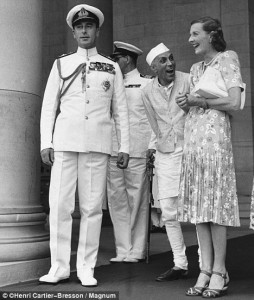 I’ve read quite a bit about the love affair that blossomed during the last days of British rule in India between Jawaharlal Nehru, India’s first prime minister, and Edwina, the wife of the last viceroy of the British Indian Empire, Lord Mountbatten.
I’ve read quite a bit about the love affair that blossomed during the last days of British rule in India between Jawaharlal Nehru, India’s first prime minister, and Edwina, the wife of the last viceroy of the British Indian Empire, Lord Mountbatten.
And nothing has been more revealing in this respect than the love letters they exchanged. Here, for example, is what Nehru (68) wrote Edwina (58) in 1959:
Suddenly I realised (and perhaps you also did) that there was a deeper attachment between us, that some uncontrollable force, of which I was dimly aware, drew us to one another.
I was overwhelmed and at the same time exhilarated by this new discovery. We talked more intimately as if some veil had been removed and we could look into each other’s eyes without fear or embarrassment.
 Given this, one can only imagine the passion they shared in each other’s company; especially in light of Edwina’s reputed nymphomania, which one assumes she attempted to satiate with a scandalous 30-year fling with a black man. Not to mention credible rumors that Nehru and her husband’s alleged bisexuality led to them engaging in “spicy ménage a trois” dalliances.
Given this, one can only imagine the passion they shared in each other’s company; especially in light of Edwina’s reputed nymphomania, which one assumes she attempted to satiate with a scandalous 30-year fling with a black man. Not to mention credible rumors that Nehru and her husband’s alleged bisexuality led to them engaging in “spicy ménage a trois” dalliances.
More to the point, though, it’s no wonder that Joe Wright, the director of such movie classics as Pride and Prejudice, would be so solicitous to capture this historically significant love affair on film. And it seemed everything was in place for him to consummate this cinematic treat – with Cate Blanchette starring as Edwina and Hugh Grant as her cuckolded husband.
Unfortunately, Wright’s artistic quest for authenticity and India’s vaunted tradition of sexual repression in films proved irreconcilable. Because here are the restrictions the government placed on his categorical imperative of filming on location in India:
No scenes of physical intimacy between Nehru and Lady Mountbatten are allowed, no gestures or actions or words of love or affection between the two.
Clearly, with such restrictions, there’s no way Wright could do justice to this love affair. Yet the government is merely insisting that, if he wants to make this film in India, he must make it the way Indians do; i.e., in Bollywood motif where song and dance are farcical and persistent substitutes for romance … sex.
So, notwithstanding Universal’s spin about “budgetary constraints,” here’s how Wright expressed the irreconcilable difference that caused the film to be scrapped:
We were in between a rock and a hard place. The Indian government wanted us to make less of the love story while the studio wanted us to make more of the love story.
End of story….
Related book:
Indian Summer: Secret History…
Leave a Reply
You must be logged in to post a comment.